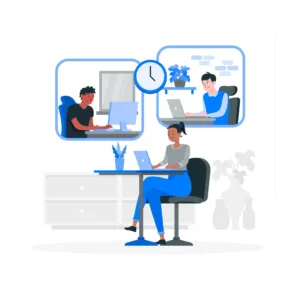In the contemporary digital environment, enterprises are progressively depending on virtual assistants (VAs) to manage a range of responsibilities, from administrative duties to intricate project management. The utilisation of virtual assistants presents several advantages; nonetheless, it also prompts apprehensions regarding the security and confidentiality of critical corporate information, encompassing exclusive business concepts and intellectual property.
Establishing robust mechanisms to safeguard these assets while collaborating with VAs is essential for preserving your competitive advantage. This blog examines essential ways for protecting your business ideas through virtual assistant standards.
1. Non-Disclosure Agreements (NDAs)
A meticulously crafted Non-Disclosure Agreement (NDA) is essential for safeguarding sensitive corporate information when collaborating with virtual assistants. This legal agreement guarantees that the VA is prohibited from disclosing your business concepts, intellectual information, or sensitive data to third parties without your authorisation.
An NDA must explicitly delineate what qualifies as sensitive information and specify the consequences for any violations. Ensure the inclusion of your intellectual property, trade secrets, business methodologies, and distinctive concepts in this agreement.
Key elements of an NDA:
- Clear definition of confidential information
- Duration of the confidentiality obligation
- Penalties for breach of contract
Using NDAs establishes a legal framework that binds your virtual assistants to keep your business secrets safe, ensuring that they understand the importance of protecting your assets.
2. Limited Access to Information
A crucial method for safeguarding your business concepts is restricting access to confidential information. Virtual assistants should possess access solely to the data or resources requisite for the execution of their responsibilities. Compartmentalising information reduces the likelihood of inadvertent exposure or misuse.
Steps to limit access:
- Assign user-specific permissions based on the assistant’s responsibilities
- Use cloud-based platforms with granular permission settings
- Restrict access to intellectual property and core business data
This approach ensures that your VA only interacts with the information necessary for their role, helping protect your broader business strategies and concepts.
3. Use of Encrypted Communication Tools
It is essential to ensure that all communications with your virtual assistant are secure to protect confidentiality. Email and instant messaging services may be susceptible to interception; therefore, utilising encrypted communication solutions is essential. Encryption obstructs unauthorised others from accessing the substance of your messages, even if the transmission is intercepted.
Consider using secure platforms like:
- Slack with enterprise-grade security features
- Microsoft Teams with end-to-end encryption options
- Signal for encrypted messaging and file sharing
This adds an additional layer of protection to any exchange of sensitive information and reduces the risk of leaks or breaches.
4. Cloud Security Protocols
It is essential to ensure that all communications with your virtual assistant are secure to protect confidentiality. Email and instant messaging services may be susceptible to interception; therefore, utilising encrypted communication solutions is essential. Encryption obstructs unauthorised others from accessing the substance of your messages, even if the transmission is intercepted.
Best practices for cloud security:
- Implement two-factor authentication (2FA) for all accounts
- Use virtual private networks (VPNs) when accessing cloud systems
- Regularly audit access logs to monitor VA activity
- Store sensitive files in encrypted folders
By following these steps, you can protect your business concepts from unauthorized access and ensure that your data remains secure.
5. Training and Protocols for Virtual Assistants
Even with legal agreements and security measures in place, human error remains a potential vulnerability. Providing your virtual assistants with regular training on data security best practices is essential for mitigating this risk.
Offer training on:
- How to handle sensitive information
- Phishing attack prevention
- Secure file-sharing methods
- Safe internet browsing and email practices
Establishing clear protocols on how virtual assistants should handle, store, and dispose of business-related information also ensures that they are aligned with your company’s data protection strategies.
6. Regular Security Audits
Consistently evaluating your security protocols is essential to maintain their efficacy over time. Perform security audits to assess existing methods and identify potential deficiencies. These audits must evaluate access controls, communication security, and data management protocols.
Security audits enable proactive identification of potential dangers and guarantee the safeguarding of your company principles. They also provide an opportunity to revise NDAs, access permissions, or protocols in light of new events.
7. Password Management Systems
Virtual assistants often need access to various online accounts and tools to complete their work. Ensuring that they use strong, unique passwords for each account is essential for maintaining security. A password management system can simplify this process by allowing your VA to store and manage passwords securely.
Popular password managers like LastPass or Dashlane enable you to share access to accounts without revealing the actual passwords, further protecting your sensitive data.
Conclusion
Safeguarding your company concepts when collaborating with virtual assistants necessitates a blend of legal protections, technological measures, and security protocols. Implementing NDAs, restricting information access, utilising encrypted communication methods, and providing frequent training helps lessen risks and safeguard your intellectual property.
Investing in these processes can safeguard your business concepts and cultivate trust with your virtual assistants, establishing a robust basis for enduring collaboration.





